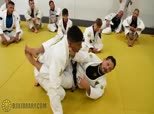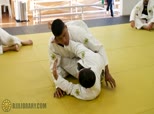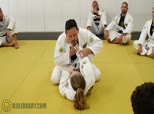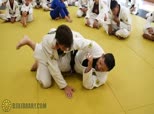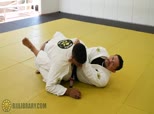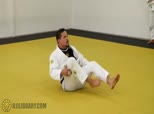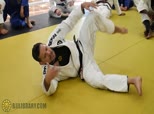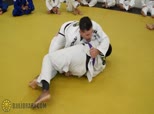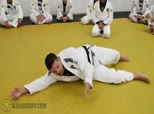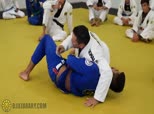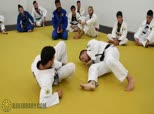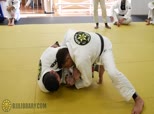Inside the University 546 - Timing Your Grips
Add to Favorites Remove From Favorites 729 2092 days ago
Saulo points out the importance of properly timing when you make your second grip, and taking it with speed and force. As his opponent comes back the other way, Saulo turns, throwing his shoulder off the mat like a punch to grab the collar. If he goes without speed or force, it will easily be defended.
Inside the University 545 - Creating the Reaction to Set Up the Cross Collar Choke
Add to Favorites 839 Remove From Favorites 2093 days ago
Saulo's typical setup for the cross collar choke begins with his cross collar grip, followed by a 45 degree hip escape as he pushes the collar away. Now his opponent reacts by coming back to him, just as Saulo wanted, so he immediately sets his second grip underneath his first. From here he pulls his opponent in, switches his hips to face the other side and flexes his wrists to finish the choke.Inside the University 544 - Staying on Your Side
Add to Favorites 809 Remove From Favorites 2094 days ago
One of the main points of focus while in the closed guard is to not be flattened out. This is why Saulo is always looking to get on his side and stay there. His collar grip arm will help him by keeping his opponent at a distance, but it's his shoulder that is doing the work. Also, it's important that his top leg is pinching down and keeping pressure on his opponent.Inside the University 543 - Getting to Side Closed Guard
Add to Favorites 914 Remove From Favorites 2095 days ago
After watching students practice, Saulo points out the difference between escaping your hips and moving to the side. When punching the collar grip, he swivels his hips so he gets to his opponent's side, staying connected. He is not escaping his hips and creating space.Inside the University 542 - Collar Choke from Closed Guard
Add to Favorites 850 Remove From Favorites 2097 days ago
From the closed guard, Saulo makes a cross collar grip and stretches his arm as he turns to the side on his hips. From here he grabs the gi on the cross shoulder and escapes his hips a little more to create his angle. Now he pulls his grips in with his elbows to his body to finish the choke.Inside the University 541 - Backward Break Falling
Add to Favorites 723 Remove From Favorites 2098 days ago
Showing some finer points of a backward break fall, Saulo emphasizes not to let your momentum keep you rolling back so your hips raise off the mat. Instead stop with your hips down and your legs in front to protect you. Also, keep your feet pointed out rather than up.Inside the University 540 - Self Protection and Breakdown of Recovering Guard
Add to Favorites 727 Remove From Favorites 2099 days ago
Breaking down the steps of recovering guard, Saulo shows the necessary movements to first protect yourself, and then look to recover guard. His main concern is always to protect himself, which is why he keeps his hands close, and doesn't overextend to reach for his opponent.Inside the University 539 - Hand Positioning when Turning Belly Down
Add to Favorites 764 Remove From Favorites 2100 days ago
Now Saulo points out that your hands should stay under your body when turning belly down. Many times people will reach for the legs and get stuck because of this. If you are reaching for the legs, it should be in effort to take your opponent down. However, in this case, we are looking to recover guard, so he keeps his hands near his body for protection.Inside the University 538 - Avoiding Turtle when Turning Belly Down
Add to Favorites 886 Remove From Favorites 2101 days ago
Tying all his movements together, Saulo shows how to avoid getting stuck in turtle when turning belly down. After escaping his hips and bringing his bottom leg through, he doesn't hang out on his knees, allowing his opponent to set up attacks. Instead he brings his other leg to S position and falls back, where he can reset his guard.Inside the University 537 - Framing Before Recovering
Add to Favorites 847 Remove From Favorites 2102 days ago
Now Saulo focuses on the importance of recovering guard with two specific movements after turning on his side. When he brings his knee in the first time, this is to set his frame. He is not yet looking to recover because he doesn't have the space. Next he escapes his hips, and now he has the space to bring his knee in more and begin to recover.Inside the University 536 - Back and Forth Hip Movement
Add to Favorites 736 Remove From Favorites 2104 days ago
Saulo breaks down the fundamental movement of the hips while recovering guard. After his bridge, while still on his side, he is using a back and forth motion to gain momentum, whether he goes to recover guard or turn belly down. If he recovers, his inside leg now becomes a frame against his opponent's body, and a new point of leverage to use.Inside the University 535 - Recovering Guard when Your Opponent Passes Your Legs
Add to Favorites 905 Remove From Favorites 2105 days ago
Saulo's opponent is passing his guard, so as soon as he gets around the legs, Saulo's first move is to turn on his side at his 45 degree angle, with both elbows attached to his body. His opponent drops his weight to put pressure, so Saulo bridges to create space. If he now has room to move his hips, he brings his legs in to recover guard.
